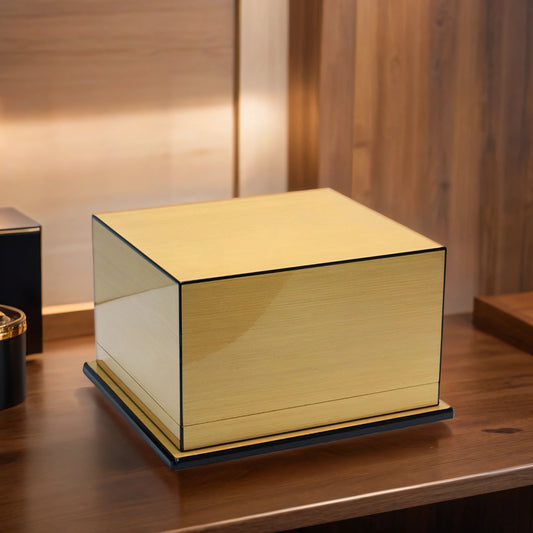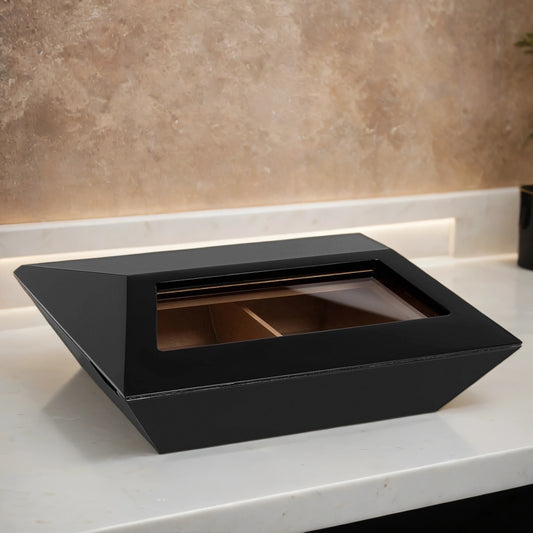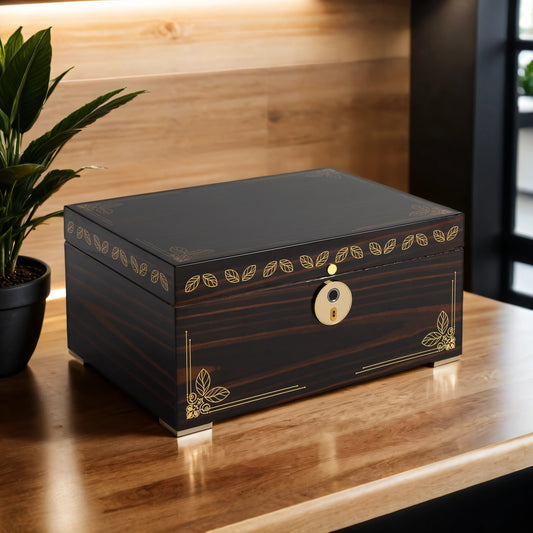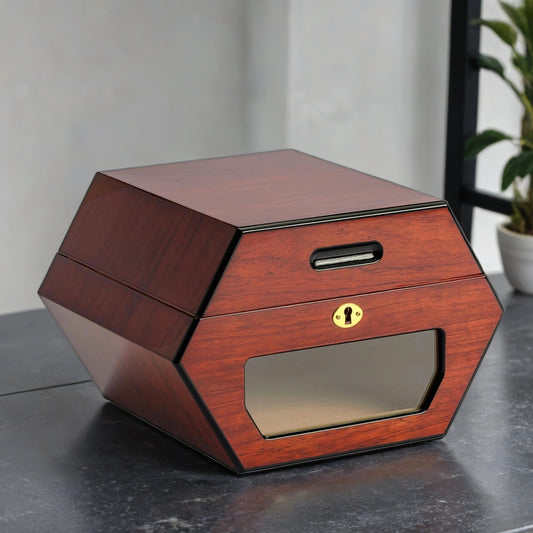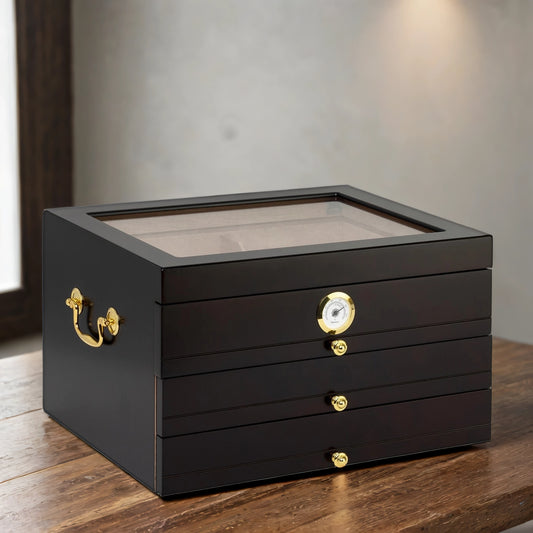
Do Cigars Go Bad? How Long They Last and How to Store Them Right
You’ve got a humidor full of cigars, or maybe a few sticks you forgot about in a drawer. Now you’re wondering if cigars go bad. Can cigars expire like food, or are they good forever if you store them properly?
The short answer is yes, cigars can go bad, but not in the traditional sense. They don't spoil like food, but they can dry out, grow mold, or lose their flavor over time. Cigars are made from natural, fermented tobacco and respond to their environment. The good news is that with the right storage, cigars can last for years and even improve with age.
Can Cigars Expire?
Cigars do not have a set expiration date. However, tobacco is organic and will deteriorate if neglected. When exposed to dry air, heat, or fluctuating conditions, cigars lose their essential oils. That is what causes them to become brittle, bland, or bitter. A cigar that has dried out or absorbed too much moisture will not smoke the way it was intended, and may also become moldy after enough time in that environment.
In short, cigars don’t expire like perishable goods, but they definitely have a shelf life.

How Long Do Cigars Last Without a Humidor?
Without proper storage, cigars begin to lose quality quickly. The lifespan of a cigar outside a humidor depends on the surrounding environment.
- In a dry climate, cigars may become unsmokable in just one or two days.
- In a mild, humid room, they might stay intact for up to a week.
- If stored in a plastic bag with a humidity pack, they can last a couple of weeks before starting to degrade.
Once a cigar dries out, the wrapper can crack, the draw becomes tight, and the flavor fades. While some dried cigars can be rehydrated using slow and controlled methods, the original flavor and aroma usually do not come back.
If you plan to smoke a cigar within a few days, you can get by without a humidor. If you’re storing cigars longer than a week, you need a better solution.
| Storage Method | Estimated Lifespan | Notes |
|---|---|---|
| Open air (no protection) | 1 to 3 days | Dries out quickly, flavor deteriorates fast |
| Ziplock bag (no humidity control) | 3 to 7 days | May preserve structure briefly but loses oils and aroma |
| Tupperware with humidity pack | 2 to 3 weeks | Works as a short-term humidor substitute |
| Humidor (stable RH and temp) | Indefinite | Preserves flavor and structure long term |
| Cellophane in humidor | Indefinite | Adds protection from cross-contamination and humidity swings |
| Glass tube in humidor | Indefinite | Excellent seal, ideal for long-term aging |
How Long Can Cigars Last in a Humidor?
In a well-maintained humidor, cigars can last indefinitely. Many aficionados store cigars for several years and enjoy them even more as they age. The key is maintaining stable conditions that preserve the oils and structure of the tobacco.
Keep your humidor at:
- 65 to 72 percent relative humidity
- 65 to 70 degrees Fahrenheit
- A consistent temperature without major fluctuations
Cigars stored in these conditions can remain fresh, flavorful, and ready to smoke for years. Some will even improve in taste as the tobaccos continue to mature and blend. If the cigars are in cellophane, they will have additional protection against humidity changes and cross-contamination of aroma.
There is no upper limit to how long cigars can last in a humidor as long as you care for the environment they are stored in.
How to Tell if a Cigar Is Bad
Not all cigars go bad the same way. Here are a few signs to look out for if you're unsure whether a cigar is still good to smoke.
1. Dry or brittle texture
If the cigar cracks when you squeeze it gently, or if the wrapper is flaking, it has likely dried out. A dry cigar burns too quickly and produces a harsh, bitter smoke.
2. Too soft or spongy
On the opposite end, an overly moist cigar feels mushy and may not burn evenly. It can also taste sour and may be more prone to mold growth.
3. Mold on the wrapper
White, fuzzy, green, or blue spots on a cigar are mold. Unlike plume, which is a harmless crystalline dust from natural oils, mold is a sign of excess moisture and poor storage. Mold ruins the cigar and can spread to others in your humidor.
4. Musty or sour smell
A good cigar should have a rich, earthy aroma. If it smells musty, damp, or completely flat, it has likely absorbed moisture or lost its essential oils.
5. Dull or bitter flavor
A cigar that has gone bad might still look okay but taste completely off. When the tobacco dries out or deteriorates, the flavor disappears or turns unpleasant.

How to Store Cigars Properly
The best way to preserve cigars long term is to keep them in a properly seasoned humidor. Whether you are storing five cigars or fifty, the following tips apply.
- Use Spanish cedar-lined humidors, which help regulate moisture and protect against pests
- Maintain relative humidity between 65 and 72 percent
- Keep the temperature steady between 65 and 70 degrees Fahrenheit
- Use a digital hygrometer to monitor the conditions accurately
- Avoid placing your humidor near windows, heaters, or vents
- Use humidity packs or calibrated humidification systems
- Rotate your cigars occasionally to help them age evenly
If you are storing cigars for the long term, consider using cellophane, glass tubes, or cedar wraps for extra protection. If you’d like a shortcut to understanding what makes a great humidor, our article on the best rated cigar humidors of 2025 covers all our standout models and what they offer.
Do Cigars Get Better With Age?
Yes, some cigars improve with age when stored in proper conditions. Aging allows the tobaccos to marry and mellow, resulting in smoother, more nuanced flavors.
Full-bodied cigars with complex blends and oily wrappers often benefit most from aging. However, not all cigars are designed for it. Milder blends may lose their character if aged too long. If you plan to age cigars, label them with the date you stored them and taste one every few months to track their development.
The aging process is part of the enjoyment for many cigar lovers and adds a new layer of appreciation to the hobby.

Final Thoughts
Cigars may not expire in the traditional sense, but they are not immune to time and environment. With the right storage setup and a little attention to detail, your cigars can last for years and even get better with age.
Know the signs of a bad cigar, learn how to maintain your humidor, and keep your collection in top shape. Whether you’re saving a special cigar or aging your favorites, proper care will protect your investment and elevate your smoking experience.
Frequently Asked Questions
Do cigars go bad in a humidor?
They can if your humidity or temperature levels are off. Too much moisture can cause mold, while too little can dry them out. Keep your humidor in the right range and check it regularly.
How long do cigars last in cellophane?
Cellophane protects cigars from humidity changes and helps preserve their aroma. When stored in a humidor, cigars in cellophane can last for years without losing quality.
Is it safe to smoke an old cigar?
It depends on how it was stored. If the cigar smells right and isn’t moldy, it’s probably safe. However, the flavor may be dull if it’s dried out or poorly aged.
What is the ideal humidity level for storing cigars?
Aim for 65 to 72 percent relative humidity. Some smokers prefer the lower end of the range to improve combustion, while others prefer a higher level for smoother flavor.
How can I tell the difference between mold and plume?
Plume is a fine, white, powdery dust that can be wiped off easily. Mold is fuzzy or spotty and tends to grow in patches. If you are unsure, it is better to play it safe and discard the cigar.

